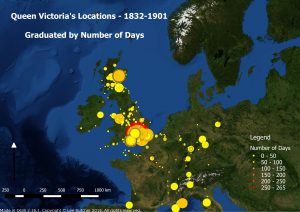Digital History is a subfield of the Digital Humanities, a scholarly practice that uses digital tools and methods to answer research questions.
Humanities researchers have used digital tools and methods for many decades. The field is often dated to the 1940s, when Father Roberto Busa worked with IBM to create Index Thomisticus, a tool for performing text searches across the works of Thomas Aquinas.
As with many disciplines, the practice was initially limited to the few people who had access to computers, but the development of university-based computing centres in the 1960s and 1970s and the appearance of personal computers in the 1980s, led to more widespread applications. Historians used computers for statistical analysis in these early decades, and they were central to the growth of the so-called Cliometrics movement. The development of CD-ROMs produced a new phase, for digital history and digital humanities more broadly, as it became possible to digitize source material and make it freely available alongside scholarly commentary. The increasingly widespread adoption of the World Wide Web during the 1990s, and the development of so-called ‘markup languages’ such as html and xml quickly made CD-ROMS redundant but opened up a range of possibilities for digital scholarly editing and publishing.

Lee Butcher used GIS mapping technology to trace Queen Victoria’s location based off of her journal entries. This study made possible a statistical analysis of the changing patterns of royal visitations to each of the principal residences.
As the ‘digital turn’ gathered pace after the turn of the millennium, funding agencies began to invest in the field, new government and institutional archives made large corpuses of evidence available, and new technologies opened up a very wide range of tools and methods. Today, digital historians work with evidence ranging from the documents that comprise the Georgian Papers Programme to census and health data, and the vast Google Books corpus. Techniques range from multi-spectral imaging to Natural Language Processing, crowd-sourcing, and social network analysis. Many projects deploy Geographic Information Systems (GIS) to help their teams understand spatial data. A new generation of tools are allowing researchers to explore virtual historical worlds and connect audiences to the past in innovative new ways. Historical pedagogy is also being changed, both in the delivery of teaching and dissemination of research to public audiences.
The Georgian Papers Programme traverses several of these core practices in Digital History, from archival and library science to digital transcription, markup, and analysis. As the project matures many more opportunities for computational analysis and public engagement will present themselves.
